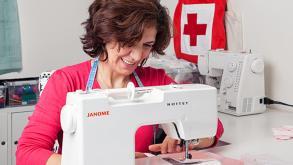By harnessing evidence of good practices, the upcoming State of the World's Volunteerism Report will be an important tool for organizations to use in their activities and discussions with policy makers that could lead to a greater recognition of volunteerism as a development asset.
Ahlem Özdemir is a talented seamstress living in the multicultural community of Moerwijk, a diverse neighbourhood near The Hague, Netherlands. For the past 10 years, she has spent two days a week teaching migrant women how to make and alter clothes. Last year, she won the 'Hero of The Hague' award in the Culture category for her work.
With a large migrant and elderly population, the Moerwijk community faces issues such as discrimination and a lack of solidarity among residents. The Red Cross Netherlands works with volunteers like Ahlem to help the community develop and become more self-sufficient.
It struck me that while people may come from different walks of life and have different ethnic backgrounds, they shared a close relationship with each other, which may be one of the effects of volunteerism taking place there
“Combining an activity while speaking Dutch helps the residents learn the language, grow their networks and supplement their finances,” said Ahlem. Some of these activities include sewing classes, first aid and self-defence courses. They also offer support to complete important paperwork.
Linking volunteerism with resilience
Bahar Azizi is a recent graduate of psychology and a new Red Cross volunteer in the Netherlands. With her academic background, Bahar uses her research experience to collect data on volunteerism’s impact on ‘resilience’ or the ability to anticipate, cope and recover from outside shocks.
“I was warmly welcomed when I first arrived at the Red Cross neighbourhood centre – also called the neighbourhood ‘store’ – where community members come together. It struck me that while people may come from different walks of life and have different ethnic backgrounds, they shared a close relationship with each other, which may be one of the effects of volunteerism taking place there,” said Bahar.
Bahar is one of the 24 field researchers deployed by the United Nations Volunteers programme to conduct field research in 15 fragile and post-conflict communities for the next edition of the State of the World’s Volunteerism Report.
The upcoming report will attempt to understand how to best strengthen the contribution of volunteerism to wider response and resilience-building efforts, and to harness complementarity through development of policy, practice and investment, as part of a wider resilience agenda.
A unique feature of this report is that it is volunteer-led research. It takes advantage of experiences and evidence of good practice by involving volunteers as part of a process of applied research methodologies.
The IFRC and Red Cross and Red Crescent Societies in the Netherlands, Burundi and Egypt are contributing to this edition by supporting volunteer placements and the research and documentation of all types of volunteerism.
Towards a resilient community
Bahar said there can be no resilient communities without resilient individuals. “As members of the community come together at the neighbourhood centre, they start building friendships, thereby widening their network, learning from one another and boosting confidence,” she said. “These are all critical factors to building resilience.”
Another popular resilience-oriented course taught by volunteers is a workshop on how to act during potentially dangerous situations. The four-day course involves role-playing with residents acting in hypothetical scenarios like robberies, scamming, flooding, and other potentially dangerous situations. Volunteers and police officers guide them and offer advice on the most effective ways to respond.
“Volunteerism builds bridges and is a source of community strength, resilience, solidarity and social cohesion,” Bahar said. “In the case of the Moerwijk community, actions like teaching residents to sew clothes or to act in emergency situations, prepare them to prevent and survive otherwise devastating conditions.”
This case is just one of the many examples of the potential of volunteerism to build resilience at the local, national and global levels. In the next six months, volunteer researchers in all parts of the world will be generating community data, evidence and stories for analysis for the State of the World’s Volunteerism Report.
By harnessing evidence of good practices, the next report will be an important tool for organizations including the IFRC and Red Cross and Red Crescent societies to use in their activities and discussions with policy makers that could lead to a greater recognition of volunteerism as a development asset.
The next State of the World's Volunteerism Report will be launched in 2018.

